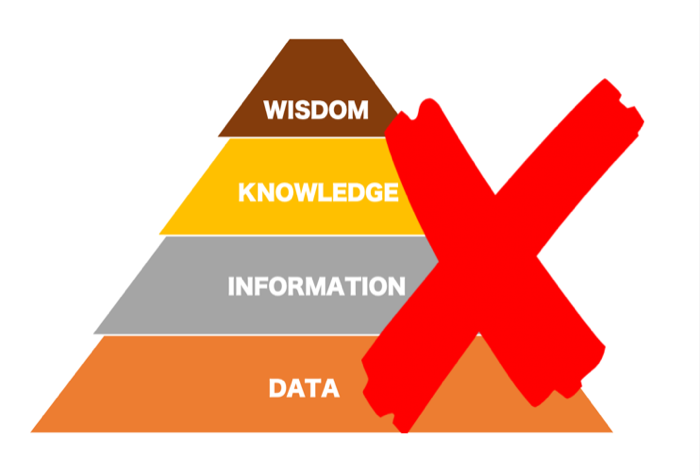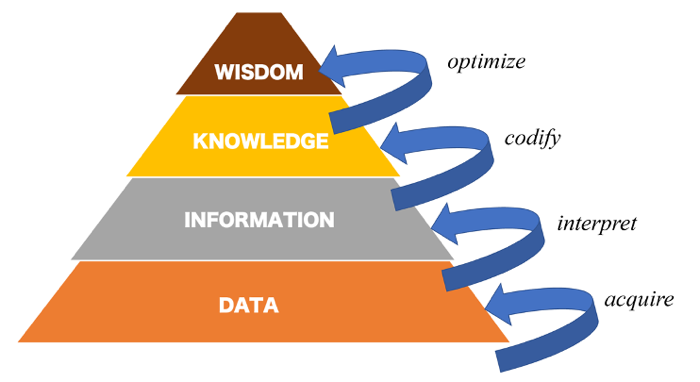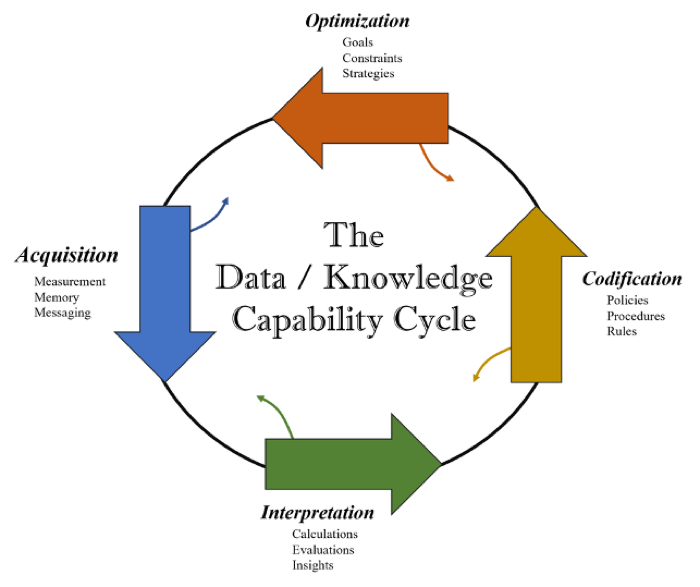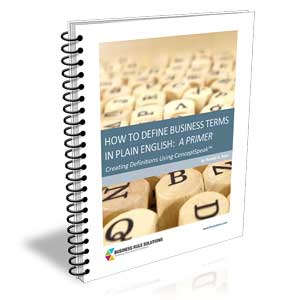A Better World View for Data & Knowledge

The whole 'data-information-knowledge-wisdom' thing (remember the age-old DIKW pyramid?) sends entirely the wrong message in the Knowledge Age. We need a better world view!
What's wrong with the DIKW pyramid?
- First, whatever it is it's not a stack; it's obviously a cycle. It had better be running continuously.
- Second, I'm interested in what communities know, not so much what individuals know. For that, you need communication and shared understanding.
Let me put it to you this way. As an individual you can think you know something, collect data to prove/disprove what you think you know, and perhaps if you are able to prove enough to yourself become individually wise.
So what?! That's just about you. What about the rest of us? We all live and work in communities. If you fail to communicate effectively (including, yes, messaging out your data), what you think you know makes no difference whatsoever to anyone but yourself.
So, I believe data arises from knowledge (perhaps bare-boned) — not the reverse. Why would you ever collect data if you didn't think you knew a little something to begin with? Who's interested in receiving random strings of 0s and 1s with no meaning whatsoever attached? Nobody! Data is only worth something if it already has at least some meaning to some people.
People always need meaning. Communication between people depends on that meaning. It's the meaning-content of your messages that counts. Including data!
What's Right and What's Wrong with the DIKW Pyramid
I believe most people would agree that information is scarcer than data, that knowledge is scarcer than information, and that wisdom is the scarcest of all. So, the pyramid gets skinnier toward the top. Of course. But a simple pie chart could convey relative proportions, couldn't it? So, the pyramid must convey something more.
The pyramid layout also suggests all the following about the four things it lists:
- They are different.
- They can exist at the same time.
- Some are more potent and valuable than others.
This last point is where things break down. The pyramid simply doesn't say how potency and value accrue. Is it by some mysterious force of nature? Magic?
No! For potency and value to accrue, transformations are required — ones supported by communities of people who share meaning. The pyramid implies transformations in the kind and quality of meanings as you ascend, but it doesn't show them.
Currently, the pyramid is purely thing-oriented. To be explicit about transformations, it needs verbs. Without those verbs, the pyramid doesn't communicate all I think it should.
Adding Verbs
So, let's pursue some verbs to label the implied transformations in the pyramid.
Unfortunately, we run into a snag straightaway. 'Data' can't be made into a verb. How exactly do you 'data' something?! And if you could 'data' something (like these days you can 'Google' something), then that something would be 'data-ed'. But there's no such verb currently in the English language for that. Too bad! All you can say is that at first you didn't have data, and then through means at your disposal, you do.
Clearly, we must take some liberties with the verbs. Here's what I suggest:
- Data … You acquire it through means at your disposal.
- Information … You interpret data into information.
- Knowledge … You codify information into knowledge.
- Wisdom … You optimize knowledge into wisdom.
Let's see how that looks.

Capabilities
Now we have nouns for four things and verbs for the necessary transformations. But creating value also requires people, skills, and organizations. And time. And the right places and motivation. In other words, adding value requires organized capabilities — whole complexes of components.
So, let's shift to a capability point of view now. What fundamental capabilities are implicit in the DIKW pyramid? I would identify the following four, each with key components.
Acquisition — Often measurement is at the heart of acquiring data. Of course, it does no good to acquire data if you can't remember it, so memory is required. Likewise for messaging. If you can't communicate about it, there's no benefit to the community. So messaging ability is required.
Key Components: Measurement, Memory, Messaging
Interpretation — Interpreting 'raw data' requires computations and analyses, the goal being to identify meaningful or useful insights.
Key Components: Calculations, Evaluations, Insights
Codification — Insights that are strong enough deserve to be perpetuated. That's the goal of policies, procedures, and rules.
Key Components: Policies, Procedures, Rules
Optimization — The goal of a community that shares meaning is ultimately to thrive. To do so it needs to be prudent about its use of time and resources, and to ensure the best experiences in all interactions. Optimization of this kind is achieved through recognition of goals and constraints, then identifying the best trade-offs in the form of strategies.
Key Components: Goals, Constraints, Strategies
The Data/Knowledge Capability Cycle
You probably notice I am inching step-by-step away from 'data, information, knowledge, and wisdom'. Why?
The answer frankly is that you need those things for and within each of the four capabilities. To say it differently, we need data, information, knowledge, and wisdom for everything we do. They are actually everywhere! It's artificial to separate them out like the DIKW pyramid does. That effectively creates a disembodied body. Things don't work that way.
So, I would offer the following view, which I call the Data/Knowledge Capability Cycle. (Remember that earlier crucial point about 'cycling'?!)

Now, My Confessions
No, I don't explicitly include the terms 'information' and 'wisdom' in the Data/Knowledge Capability Cycle. Here's why.
- Wisdom. The closest I can come to a good definition that doesn't use words like 'knowledge' and 'insight' is 'good judgement' (which could be based on experience, values, fear, or a whole variety of factors). 'Good judgement' is something you exercise, not really a tangible thing. You know it when it happens.
- Information. If you receive data (or knowledge), then you are informed. Information is about communication and the receipt of messages. How does that fit as a thing alongside data and knowledge (and wisdom)?!
I do, however, have a very simple, fool-proof way to distinguish between data and knowledge.
The Knowledge Test: When something sits in front of you and you can't explain it, it's data. As soon as you can explain it correctly, it's knowledge.
I've spent most of my career (almost 50 years) thinking about rules, vocabulary, meaning, and data. Over the years I've tried many times to come up with a good way to define the differences between the four things of the DIKW pyramid along with clear examples. (I wanted to put it to work for clients!) But I've never been able to do it. When experiments fail enough times, you begin to suspect something is fundamentally askew.
Granted, I'm not a logician or semanticist, but I suspect they wouldn't be much help in this matter. My interests lie with ideas that communities and groups of people can put to practical use in business and government. In any case, I've cycled through all this more than a few times and this is where I've gotten. Perhaps you'll find it useful.
# # #
About our Contributor:
Online Interactive Training Series
In response to a great many requests, Business Rule Solutions now offers at-a-distance learning options. No travel, no backlogs, no hassles. Same great instructors, but with schedules, content and pricing designed to meet the special needs of busy professionals.











How to Define Business Terms in Plain English: A Primer
How to Use DecisionSpeak™ and Question Charts (Q-Charts™)
Decision Tables - A Primer: How to Use TableSpeak™
Tabulation of Lists in RuleSpeak®: A Primer - Using "The Following" Clause
Business Agility Manifesto
Business Rules Manifesto
Business Motivation Model
Decision Vocabulary
[Download]
[Download]
Semantics of Business Vocabulary and Business Rules